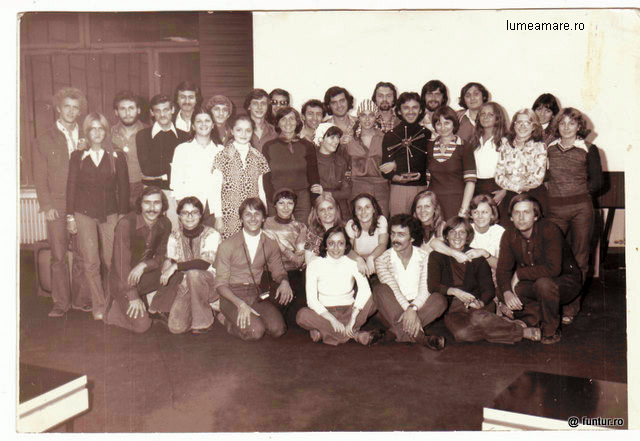A Song, Twenty Years On
The SONG group was founded in 1974 by Ioan Luchian Mihalea with students from the National University of Music.

România Internațional, 16.03.2014, 14:01
The tale we’re today going to tell you revolves around a magical figure: 20. Twenty years that a group of young people roamed the world, dressed up in jeans and Romanian traditional shirts, singing songs like nobody else had the nerve to sing them: Romanian traditional music performed with a different attitude, but also spirituals or carols, sung under a different guise, world music performed in languages other than Romanian, between the walls of a cold war, isolating us from a “decadent West”. 20 years since the group’ s founder and conductor was brutally taken away from this world.
The SONG group was founded in 1974 by Ioan Luchian Mihalea jointly with students from Bucharest’s National University of Music, and later on with Students from the Faculty of Germanic Languages. SONG made its debut with Renaissance songs and old English music. The group carried on with tours, films, recorded shows, live concerts at the Palace Grand Hall as well as trips abroad.
That was a life hard to imagine for the rest of the world, which looked upon that unusual group with admiration, and maybe with an inkling of envy. Raluca Alina Hurduc was a member of the SONG group for three years, in the mid ‘80s, which was Romania’s bleakest period. Raluca told us it was not only her youth SONG had a strong bearing on, but also all her subsequent life.
Raluca Alina Hurduc: “At that time I believe I was not aware of its entire significance. I was doing something I enjoyed, with a group of young people who at that time represented an elite; there were only students in the SONG group. It was an escape from a reality that had become terrible in the mid-1980s, it just meant joy. It was like a golden bubble surrounding us. I am positive many of my colleagues in the choir would say the same. The style and the whole energy as well as that atmosphere were by all means induced by the conductor. Adding to that was definitely the fact that we were young, the choir would always get freshened up with students, and all that contributed to the atmosphere and the typical manner in which the songs were performed.”
SONG was like a large family, this is how all-former SONG members describe it. Carmen Sandulescu, now a senior producer with RRI, says she will never forget the times she rehearsed with SONG.
Carmen Sandulescu: ”Rehearsals were truly special moments that I will never forget, because we were all very serious. We used to make jokes for 10 minutes, it was a warm, family-like atmosphere, then we started working very seriously. We used to rehearse in groups, we repeated three musical notes one million times, just like the entries…and that turned out to be very useful in the evenings when we made recordings for the television. For three songs, which were broadcast on TV, we would perform, rehearse and sing all night on stage. Back then, we didn’t fully realize that we were in sharp contrast with everything around, because we were completely intent on studying, on the one hand, and on music, on the other… Somehow, we realized that we were different, because others told us so.”
Raluca Alina Hurduc tells us about the concerts given by the SONG choir across the country:
Raluca Alina Hurduc: “We performed not only Romanian folk songs, but also spirituals and even carols, whose lyrics had been modified. Conductor Ioan Luchian Mihalea wrote some lyrics, adjusted them to suit the tunes and we sang them on stage in the 1980’s. The audience was extremely enthusiastic about those carols in disguise. The spectators were singing and applauding. I think the most important lesson that we learned was that we could do things and share them in a community, and that made us happy. It is worth taking some time to do extraordinary things, to be happy.”
How was it possible for the SONG choir to function, at the peak of the Cultural Revolution, when artists and singers found it difficult to do something truly creative? The Song choir managed to do that, by walking a tight rope that few were aware of, says Carmen Sandulescu:
Carmen Sandulescu: “We came to understand the situation in the 1980’s, when they asked questions about the name of the group, and we came up with the following formula: ‘Song’ doesn’t come from the English word, but it is made up of acronyms, it stands for ‘Suntem Oamenii Noii Generatii’, which translates into English as ‘We Are People of the New Generation.’ It was something in-between what could be seen from outside and what truly happened inside. I don’t know to what extent the members of SONG were aware of this rope they were walking, so to say.”
The person who was the soul of the choir, the conductor that kept the group together, was brutally killed in his own house in November 1993. Several weeks later, SONG gave their last concert in memory of Ioan Luchian Mihalea. 20 years on, in early March 2014, the SONG group reunited in a show broadcast live by the Romanian public television. Raluca Alina Hurduc told us how their emotion reached the audience:
Raluca Alina Hurduc: “We mobilized in less than a month. The choir members came from all parts of Romania and also from Europe and we rehearsed about 10 times for this show. It went unexpectedly well. We sang like we used to in the good old, it was not perfect but it was OK and we enjoyed every minute of it. We were happy to do this and I believe our joy got through the screens into the hearts of the viewers, given the feedback and phone calls we received after the show.”
The SONG group reunited under the baton of a young but very talented conductor, Daniel Jinga:
Daniel Jinga: “I had heard of them, I grew up listening to SONG. I am glad I had the chance to conduct this choir. We sang together, we felt nostalgic and we enjoyed the whole moment. Over the past years I have been frequently asked to make a project similar to the SONG project. That showed me that the SONG project was highly popular, actually several generations enjoyed their music and I’m sure this kind of music will also be to the liking of the young generation.”






























